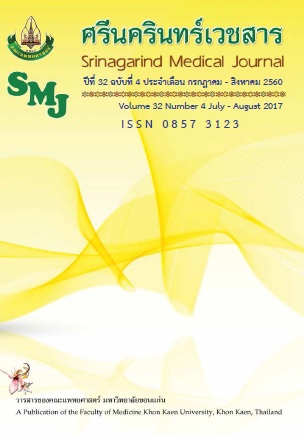Symptoms, Symptom Management and Outcome in Cancer Patients Undergoing Chemotherapy
Abstract
Background and Objectives: Chemotherapy used for treatment of cancers had many adverse consequence to patients. Consequently, patients suffer from side effects of chemotherapeutic agents and these adverse effects badly influence on physical, mental and emotional status of patients. As a result, patients have to deal with the suffering caused from cancer therapy. The aim of this descriptive study was to determine the symptom experiences , management strategies of cancer patients receiving chemotherapy and outcome of the management.
Materials and Method: Subjects included in this study were 120 of cancer patients, age between 18-65 years old, who were treated with chemotherapy at least one time. Data were obtained by interviewing about symptoms, symptom management and outcome interview scale with reliability of 0.94. The data was analyzed using descriptive statistics.
Results: The results showed that the most frequency symptoms of cancer patients receiving chemotherapy were 1) changes in food taste perception (1.25 ±1.285) 2) anorexia (1.25±1.268 ) 3) numbness of peripheral extremities (1.1 ± 1. 514 ) 4) fatigue (1.02, ± 1.156 ) and 5) insomnia (0.94 ±1.292). In addition, the results revealed that cancer patients had effective methods for symptom management resulting from chemotherapy such as changing eating habit by eating recently cooked food for 98.3% and consuming more vegetables and fruits for 94.7%, taking conventional medicine (multivitamin and sleeping pill for 86.7% and antiemetic drug for 81.7%),relaxation (sleeping for 97.5 % and talking with other peoples for 95.8 %), mood and emotional adjustment by accepting their illness for 97.5%. Most patients reported that the outcome after their symptoms management were improved in terms of less frequency, severity, and suffering of their adverse symptoms (95.8, 95.0 and 95.8 % respectively), 100% of cancer patients also had better mood and emotional status.
Conclusion: The study finding could be used in helping the patient as nurses should pay attention to overall symptoms by assessment, caring, helping and suggesting the patients to correctly manage themselves to reduce the severity of symptoms and prevent the increase of severity.
อาการ การจัดการอาการและผลลัพธ์การจัดการอาการของผู้ป่วยมะเร็งที่ได้รับยาเคมีบำบัด
อภิญญา คารมปราชญ์1, เพชรไพลิน ชัยชาญ1, อุมาพร แสนทวีสุข1, เอื้อมแข สุขประเสริฐ2
1แผนกการพยาบาลผู้ป่วยพิเศษ งานบริการพยาบาล โรงพยาบาลศรีนครินทร์ คณะแพทยศาสตร์
มหาวิทยาลัยขอนแก่น
2 ภาควิชาอายุรศาสตร์ คณะแพทยศาสตร์ มหาวิทยาลัยขอนแก่น
หลักการและวัตถุประสงค์: การรักษาโรคมะเร็งด้วยยาเคมีบำบัดก่อให้เกิดผลกระทบต่างๆต่อผู้ป่วยอย่างมาก ทำให้ผู้ป่วยประสบกับความทุกข์ทรมานต่างๆ จากการรักษา ทั้งทางด้านร่างกาย จิตใจ อารมณ์ ซึ่งผู้ป่วยจะต้องจัดการกับความทุกข์ทรมานที่เกิดขึ้น การศึกษาเชิงพรรณนานี้ มีวัตถุประสงค์เพื่อศึกษา อาการ การจัดการอาการและผลลัพธ์การจัดการอาการของผู้ป่วยมะเร็งที่รับยาเคมีบำบัด
วิธีการศึกษา: กลุ่มตัวอย่างที่ใช้ศึกษาครั้งนี้เป็นผู้ป่วยโรคมะเร็งที่รับการรักษาด้วยยาเคมีบำบัดที่มีอายุอยู่ในช่วง 18 – 65 ปี เคยมีประสบการณ์การรับยาเคมีบำบัดมาแล้วอย่างน้อย 1 ครั้ง จำนวน 120 ราย โดยใช้แบบสอบถามอาการ การจัดการอาการและผลลัพธ์การจัดการอาการ ที่มีค่าความเที่ยง 0.94 วิเคราะห์ด้วยสถิติเชิงบรรยาย
ผลการศึกษา: พบว่าผู้ป่วยโรคมะเร็งที่ได้รับการรักษาด้วยยาเคมีบำบัด มีอาการที่พบบ่อย คือ1) การรับประทานอาหารรสชาดเปลี่ยนไป (1.25 ± 1.285 ) 2) การเบื่ออาหาร (1.25 ± 1.268 ) 3) อาการชาปลายมือ ปลายเท้า (1.1 ± 1.514) 4) อ่อนเพลีย อ่อนล้า ไม่มีเรี่ยวแรง (1.02 ± 1.156 ) และ 5) การนอนไม่หลับ (0.94 ±1.292) การจัดการกับอาการโดยภาพรวม คือ มีการปรับเปลี่ยนพฤติกรรมการรับประทานอาหารโดยรับประทานอาหารที่ปรุงสุกใหม่ๆ ร้อยละ 98.3 การเพิ่มการรับประทานผักและผลไม้ ร้อยละ 94.7 ด้านการใช้ยาแผนปัจจุบัน พบว่า ผู้ป่วยรับประทานยาวิตามิน ยาบำรุงเลือด ยานอนหลับ ร้อยละ 86.7 ยาแก้คลื่นไส้ อาเจียน ร้อยละ 81.7 ด้านการผ่อนคลาย ผู้ป่วยเลือกวิธีพักผ่อน/นอนหลับ ร้อยละ 97.5 และเลือกวิธีพูดคุยกับคนอื่นๆ ร้อยละ 95.8 ด้านการปรับความรู้สึกและอารมณ์ ผู้ป่วยยอมรับความเจ็บป่วย ร้อยละ 97.5 ภายหลังการจัดการอาการด้วยวิธีต่างๆ พบว่า ความถี่ ความรุนแรงและความทุกข์ทรมานของอาการลดลง ร้อยละ 95.8, 95.0, 95.8 ตามลำดับ ส่วนผลลัพธ์การจัดการอาการของผู้ป่วยมะเร็งที่ได้รับยาเคมีบำบัด ด้านสภาพจิตใจและอารมณ์ พบว่าดีขึ้น ร้อยละ 100
สรุป : สามารถนำผลการศึกษาไปใช้กับผู้ป่วยได้ โดยพยาบาลประเมินอาการ ดูแล ช่วยเหลือและแนะนำวิธีการปฏิบัติตัวที่ถูกต้องเพื่อลดความรุนแรงของอาการและป้องกันไม่ให้อาการรุนแรงมากยิ่งขึ้น




